The U.S. Supreme Court heard gun rights arguments Wednesday to decide if a New York law requiring someone show cause in order to be approved for a license to carry a firearm outside of their home violates the Second Amendment.
New York is one of seven states in the country that allows a person to carry a firearm in public only if they can demonstrate that they have a need to do so. New York officials argue that if the Supreme Court strikes down this statute, it could have a domino effect, jeopardizing the other states that have this law, as well as endanger others that restrict public carry in places like airports or schools.
Meanwhile, 41 states are considered “shall issue” jurisdictions, notes CBS News. A “shall issue” jurisdiction means that applicants seeking a concealed carry license must meet a basic set of requirements under state law to receive one but do not need to demonstrate a need to carry. Some states also now require no permit at all.
Former U.S. Solicitor General Paul Clement — who spoke on behalf of the petitioners during the Supreme Court’s hearing on New York State Rifle & Pistol Assn. v. Bruen on Wednesday — offered a counterargument to New York officials’ position.
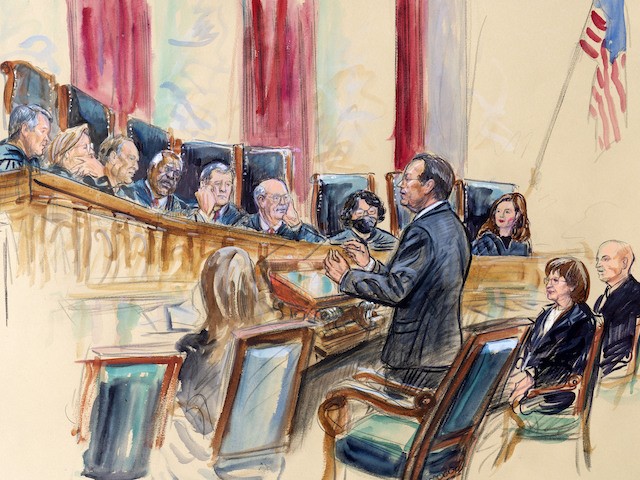
This artist sketch depicts Paul Clement standing while speaking to the Supreme Court, November 3, 2021, in Washington. Seated right of Clement is Barbara Underwood, Solicitor General New York, and Brian Fletcher, Principal Deputy Solicitor General, Department of Justice Washington. (Dana Verkouteren via AP)
Clement argued that the mere concept of needing “to show that you have an atypical need to exercise the right that distinguishes you from the general community” does not describe a right, but rather, “describes a privilege.”
“It does not describe a constitutional right. That is a sufficient basis to invalidate the law,” Clement said.
Chief Justice John Roberts — who some may believe to be a swing vote in this case — appeared likely to strike down New York’s law, noting that “regardless of what the right is, it would be surprising to have it depend upon a permit system.”
“You can say that the right is limited in a particular way, just as First Amendment rights are limited, but the idea that you need a license to exercise the right, I think, is unusual in the context of the Bill of Rights,” Roberts said.
Roberts also suggested that there is a difference between licensing in order to check if an individual has a criminal record and licensing in order to simply exercise one’s right under the Second Amendment.
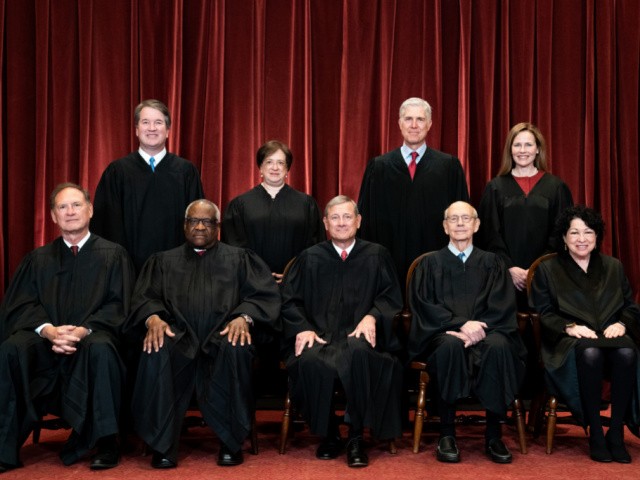
Members of the Supreme Court pose for a group photo at the Supreme Court in Washington, DC, on April 23, 2021. Seated from left: Associate Justice Samuel Alito, Associate Justice Clarence Thomas, Chief Justice John Roberts, Associate Justice Stephen Breyer, and Associate Justice Sonia Sotomayor, Standing from left: Associate Justice Brett Kavanaugh, Associate Justice Elena Kagan, Associate Justice Neil Gorsuch, and Associate Justice Amy Coney Barrett. (Erin Schaff-Pool/Getty Images)
Justice Brett Kavanaugh asked New York Solicitor General Barbara Underwood — who spoke on behalf of the respondents — what she believes the problem is with shall-issue jurisdictions that exist in other states.
Underwood claimed that “shall-issue regimes” mean more people will be carrying firearms, which can “greatly proliferate the likelihood that mistakes will be made, fights will break out.”
“But has that happened in those states?” asked Kavanaugh of shall-issue jurisdictions in other states. “Can you make a comparative judgment?”
Kavanaugh added:
Because it seems like before you impose more restrictions on individual citizens and infringe their constitutional rights based on this theory, you should have to show, well, in those other states that have shall issue-regimes, actually, there is a lot more accidents, crime. And I don’t see any real evidence of that.
When Brian Fletcher — who spoke on behalf of the Biden administration supporting New York’s restrictions — suggested the New York law is a “legitimate regulation” because “similar laws have been enacted” not just in New York and other states, but “throughout large swaths of our nation’s history,” Justice Samuel Alito pushed back.
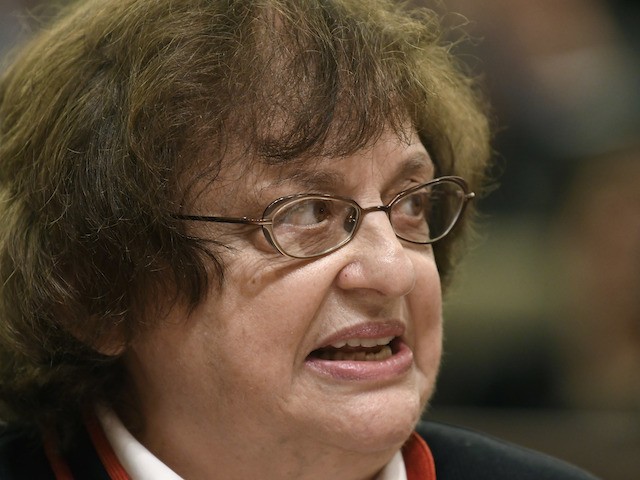
Barbara Underwood speaks to Legislative leaders interviewing her for the Office of the Attorney General after former Attorney General Eric Schneiderman resigned amid domestic abuse allegations, May 15, 2018, in Albany, New York. (AP Photo/Hans Pennink)
“Would we be receptive to arguments like that if we were interpreting, let’s say, the First Amendment or the Confrontation Clause of the Sixth Amendment?” Alito inquired.
Alito added that one “can find a lot of state laws and state court decisions” from the late 19th Century and early 20th Century “that are inconsistent with a claim that is made based on the original meaning of — a provision of the Bill of Rights.”
Justice Clarence Thomas pointed out that Underwood appears to rely on “the density of the population” when making her argument about keeping the New York law, and is thus suggesting that “the more rural an area is, the more unnecessary a strict rule is.”
Thomas, therefore, wondered what the cutoff would be between rural and high-density locations, asking, “how rural does the area have to be before [New York’s] restrictions shouldn’t apply?”
Justice Amy Coney Barrett, however, appeared open to New York officials’ arguments defending its regulations and mentioned New York City during New Year’s Eve being a “sensitive place” where “people are on top of each other.”
Barrett said:
I think the way the New York statute works is consistent with a reasonable rule, which is that there’s not a cutoff, there’s not a number at which things change, but that licenses — unrestricted licenses are much more readily available in more — in less densely populated upstate counties than they are in dense metropolitan areas.
“I guess it’s about the level of generality,” Barrett continued. “If you concede, as I think the historical record requires you to, that states did outlaw guns in sensitive places.”
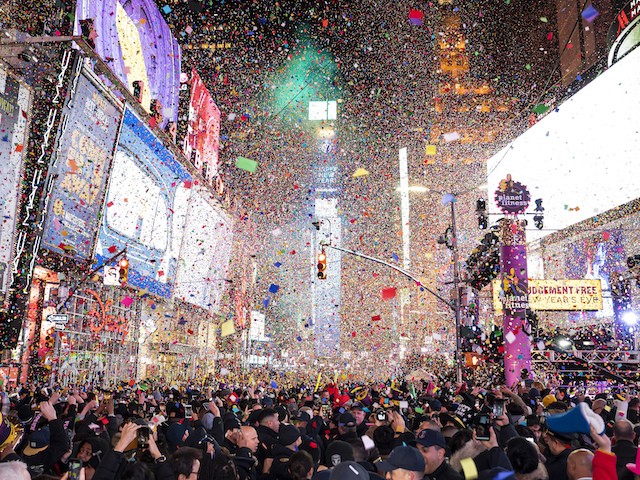
In this January 1, 2020 photo, confetti falls at midnight on the Times Square New Year’s Eve celebration in New York. (Ben Hider/Invision/AP, File)
“Can’t we just say Times Square on New Year’s Eve is a sensitive place? Because now we’ve seen, you know, people are on top of each other, we’ve had experience with violence, so we’re making a judgment, it’s a sensitive place,” Barrett added.
Even if Justice Barrett does side with New York officials, Justices Clarence Thomas, Samuel Alito, Neil Gorsuch, Brett Kavanaugh — and possibly even Chief Justice John Roberts — may not.
The case is New York State Rifle & Pistol Association v. Bruen, No. 20-843 in the Supreme Court of the United States.
You can follow Alana Mastrangelo on Facebook and Twitter at @ARmastrangelo, and on Instagram.
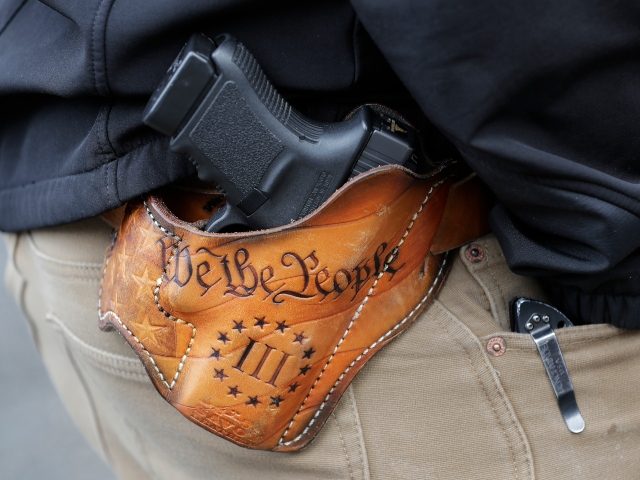
COMMENTS
Please let us know if you're having issues with commenting.